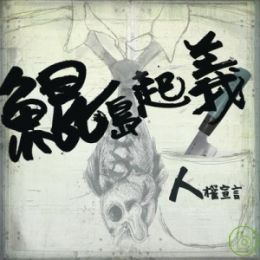| 授權 |

|
《鯤島起義》以創用CC授權釋出 |
|
撰文 / 莊庭瑞
本文轉載自創用CC-Creative Commons Taiwan (2009/08/05)偶然的機會接觸到這張音樂專輯,叫做《鯤島起義之人權宣言》。牽引我眼睛的不是CD包裝盒側邊的冷冽文案: 2008的冬天,鯤島幫的青年首次集結發聲。以素樸的熱情,與對平等正義的信仰創作,搖滾對社會的關懷! 而是近乎「職業性」本能所瞄到、不起眼的創用CC授權標示。這張由迦鎷文化音樂國際有限公司發行的專輯,以「姓名標示 — 非商業性」方式釋出。 CD包裝盒上卻也同時標示了國際特赦組織台灣總會以及「小地方音樂季」 (Small Place Tour) 的網址。著作權與人權有關嗎? 原來這是去年底由中南部十所大專院校社團、以及台灣十多組獨立樂團發起,共同為人權發聲,巡迴演出十數場的紀念專輯。去年為了紀念世界人權宣言60週年,國際特赦組織以多場次、持續舉行、小型演唱會的方式,來呼喚普世大眾關注人權議題。這項全球的在地活動就稱為「小地方音樂季」。 這些演唱會、唱片不是由國際特赦組織出資舉辦或發行,而是由音樂人主動將他們的演出、作品與人權議題結合,以求能將觸角伸得更遠更深。而台灣的這張紀念專輯能以創用CC方式釋出,也就分外令人感念了。
"Whale Island Uprising" CC-licensed By chance I encountered this CD album titled "Whale Island Uprising: Declaration of Human Rights". What caught my eyes actually is not the reflective words on the cover of album package (my apology for the following inadequate translation): In the Winter of 2008, the youth of the Whale Island gang first put together their voices. With their plain and pure passion, and their believe in equity and justice, they brought out these works to show they care! Rather, it is the small CC BY-NC mark at the back of the album cover that I recognize by instinct. On the cover, there are also links to Amnesty International Taiwan and the Small Place Tour events. How would human rights and copyright rights connect in this CC-licensed CD produced by Gamaa Music? The connection is that music societies in ten colleges in central and southern Taiwan, as well as many indie bands, collaborated in organizing more than 10 Small Place Tour concerts last year. Year 2008 is the 60th anniversary of the universal declaration of human rights. Amnesty International had been working with artists and musicians everywhere in giving small concerts, so as to reach out to people to care for worldwide human rights issues. This global campaign was called the Small Place Tour. These concerts and the albums were not funded by Amnesty International; they were voluntary efforts by the participating artists and musicians. By using music to promote human rights, it was hoped that the message would touch upon more people. It is by this connection that I feel especially thankful that the "Whale Island Uprising" album is released under a CC license. 參考網路資源:
典藏品快速搜尋...
相關專題文章...更多資料閱讀與查詢...引用資訊...
|
||
